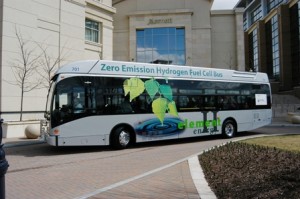The transit bus market is ideal for initiating the first steps towards a hydrogen economy. Hydrogen fuel cell powered buses can provide urban and commercial areas with advantages over typical transportation methods due to their quiet, greenhouse gas emission free capabilities.  There are approximately 921 transit buses that provide public transportation services in Connecticut.
There are approximately 921 transit buses that provide public transportation services in Connecticut.
Although the efficiency of conventional diesel buses has increased, these vehicles have the greatest potential for energy savings by using high efficiency fuel cells. FCEBs have an average fuel economy of approximately 7 miles per diesel gallon equivalent.The average fuel efficiency of conventional diesel transit buses is approximately 3.87 miles per gallon. A transit bus powered by fuel cell technology, operated on hydrogen from renewable sources, could displace approximately 89.3 metric tons of CO2 and approximately 44 pounds of NOX emissions, annually. The use of hydrogen has the potential to reduce diesel fuel use by approximately 8,800 gallons per vehicle, per year. (see Fuel Cell Electric Buses: A Business Case for Clean Transportation in Connecticut)
While there are significant efficiency and environmental benefits associated with FCEBs, expended use of FCEBs may require: 1) fueling infrastructure to be co-located with the FCEB storage facilities, 2) redundancy of fuel supply, 3) generally accepted fuel measurements & certifications, and 4) an established track record for up-time performance.
For more information on FCEB operations, please access the United States Department of Energy National Renewable Energy Laboratory (NREL) report:
Fuel Cell Buses in U.S. Transit Fleets: Current Status 2017
